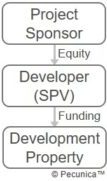A real estate developer is the original owner and initiator of a real estate development project, the intermediary between the project service providers, and the party responsible for overall development through to its realization. Generally, the business objective of property developers is to make a profit on the sale of the built property upon project exit.
A property developer is not a real estate investor, who purchases buildings and sells or rents them. Nor is a developer a contractor, who is appointed to carry out construction works.
In the pre-construction phase, developers acquire the land, determine the property's marketing, develop project definition and building design, obtain the entitlements, and raise the financing. In the construction phase, they develop the facilities. Post-construction, they either sell the properties or retain, rent out and manage them.
A pure-play property developer focuses on build-to-sell projects, which are disposed of either before or upon construction completion. Other property developers may undertake build-to-own projects, which they hold and manage as long-term investments and lease out to tenants (build-to-rent).
A project sponsor is the original investor in a development project. Sponsor equity is the amount of equity capital the sponsor invests in a project when it is initiated, typically in a special purpose vehicle (SPV) that is established solely for the project.


Property owners, construction companies, institutional investors, public or quasi-public agencies or some special-interest group undertake property development projects as property developers. Property developers generally take the greatest risk in real estate development projects but also have the greatest potential reward.
It is the responsibility of the property developer to ensure the sustainability of a property throughout its whole-life cycle. For this, the property developer must adopt and implement sustainable development principles along the entire development project value chain.

